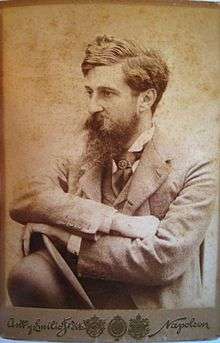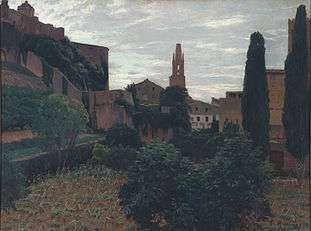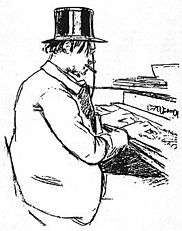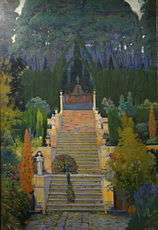Santiago Rusiñol
Santiago Rusiñol i Prats (Catalan: [səntiˈaɣu ruziˈɲɔl], Spanish: [santiˈaɣo rusiˈɲol]; 25 February 1861 – 13 June 1931) was a Spanish painter, poet, and playwright. He was one of the leaders of the Catalan modernisme movement.[2]
Santiago Rusiñol i Prats | |
|---|---|
 Rusiñol in 1892 | |
| Born | 25 February 1861 |
| Died | 13 June 1931 (aged 70) Aranjuez, Spain |
| Nationality | Spanish |
| Education | Studio of Tomás Moragas |
| Known for | Painting, Poetry, Theater |
| Movement | Modernisme |
| Spouse(s) | Lluïsa Denís[1] |
He influenced Pablo Picasso as a modern artist, and also left a number of modernist buildings in Sitges, a town in Catalonia.
Life

Rusiñol was born in Barcelona in 1861, to a family of industrialists in textiles with origins in Manlleu. Despite the fact that he was the heir to the family's lucrative operations, by the time he was a teenager Rusiñol already showed a strong interest in painting and travel.
His training as painter started at Centro de Acuarelistas de Barcelona under the direction of Tomàs Moragas. Like so many artists of the day, he travelled to Paris in 1889, living in Montmartre with Ramon Casas and Ignacio Zuloaga. He died 1931 was laid to rest on the Cemetery of Montjuïc.
Style
Much of his work in Paris belonged to the Symbolism painting style. While there, he also attended the Gervex Academy, where he discovered his love for modernism. After returning to Spain, he settled in Sitges, founding a studio/museum named Cau Ferrat. When back in Barcelona, he was a frequent client of the café Els Quatre Gats, noted for its association with modernisme and the young Pablo Picasso. He went to Mallorca with the painter Joaquin Mir Trinxet,[3] where they met the mystic Belgian painter William Degouve de Nuncques in 1899.[4]
He was most known for his plays, and landscape and garden paintings. He died in Aranjuez in 1931 while painting its famous gardens.
Gallery
- Gardens of Aranjuez
 Portrait of Utrillo
Portrait of Utrillo Girona
Girona- Rouen Street, France
 Figure Study
Figure Study Terraced Garden in Mallorca 1904
Terraced Garden in Mallorca 1904 1891 Sketch of Erik Satie playing a harmonium, by Rusiñol
1891 Sketch of Erik Satie playing a harmonium, by Rusiñol- Platans
 Terraced Garden in Mallorca 1911
Terraced Garden in Mallorca 1911 Jardio Senyorial
Jardio Senyorial Blue Courtyard. Arenys de Munt
Blue Courtyard. Arenys de Munt- Park
Works
Paintings
- Terraced Garden in Mallorca (1904)
- Terraced Garden in Mallorca (1911) - different painting
Not chronologically listed:
- After the War. The Sad Home
- Alley in Genoa
- Avenue of Plained Trees
- Balcony with Flowers and Curtain
- Before the Morphine
- Blue Courtyard, Aryens de Munt
- Boats on the Seine
- Bridge Over a River
- La Butte
- Café Montmartre
- Calvary of Sagunto
- The Countryside
- The Countryside by the Castle
- Garden of Montmartre
- Gardens of Aranjuez (1907)
- Girona
- Entrance to the Park of Moulin de la Galette
- Female Figure
- Figure Study
- Fulls de la Vida
- Garden of Montmartre
- Gardens of the Generalife
- Interior of the Café
- Interior of the Víznar Palace
- Jardio Senyorial
- Laboratory of La Galette
- The Landing Stage
- Landscape
- Laughing Girl
- Madeleine
- Maples (Platans)
- Montmartre Cemetery
- Montserrat
- Moulin de La Galette
- Moulin de La Galette - Shooting Gallery
- Moulin de La Galette - Ticket Seller
- Moulin de La Galette - Waiting for Customers
- On Campaign
- Park
- Portrait of a Boy
- Portrait of Ramon Casas
- Portrait of Ricard Planells
- Portrait of Erik Satie at the Harmonium
- Portrait of Utrillo (two images)
- A Romance
- Romantic Novel
- Rouen Street, France
- Sant Benet de Bages Cloister
- Senyor Quer in the Garden
- Sitges Interior
- Sóller Mallorca
- Son Moragues
- Summer Shower
- Valley with Oranges
- White Farmhouse, Bunyola, Majorca
Drawings
- Concert Musicians
- Conde de Cabra. Sr. Garro
- Copy from a Wrought Iron Lamp from Nicolas Grosso
- Farming
- Farmer with Barretina
- Farmer Types
- Figure Study and Study of a Dog
- Figures Study
- Figures Study - second drawing
- Gardens of the Generalife - different drawing than to the painting
- Gateway Arch and Wall, Granada
- Grove
- Head of a Man Smoking a Pipe
- Head of an Old Man
- Landscape, City Outskirts
- El mascaró de proa
- Open-air Tea
- Pisa Cemetery
- Portrait of a Man - six different sketches
- Portrait of Pere Ferran
- Portrait of Carles Mani
- Portrait of Genís Muntaner
- Portrait of Salvador Robert
- Portrait of Alfred Sainati
- Portrait of the Sculptor Carles Mani and Painter Pere Ferran
- Rustic Courtyard
- Seated Girl
- Seated Man from Behind
- Sketch of Erik Satie playing a harmonium
- Sketch from Life
- Sketch of a Port
- Study of a Garden
- Study of a Male Head - four different sketches
- Study of a Woman and Children
- Study of Children and Figures of Men
- The Virgin from the "Vision of St. Bernard" by Filippo Lippi, based on a painting by Filippo Lippi
- View of Barcelona Port
- Village Street, Granada
- Waiting for Customers
- Washing Place Interior
See also
References
- Isabel Coll, 2000.p 62
- Martín Bourgon, María Teresa. "Rusiñol y Prats, Santiago - Museo Nacional del Prado". www.museodelprado.es. Retrieved 2018-01-02.
- https://books.google.com/books/about/El_archiduque_Luis_Salvador_Rub%C3%A9n_Dar%C3%AD.html?id=iwANAAAAIAAJ&redir_esc=y El archiduque Luis Salvador, Rubén Darío y Santiago Rusiñol en Mallorca
- Sureda, Joan (1998-10-27). Book mentioning Casa Trinxet. ISBN 9788446008149. Retrieved 2012-08-11.
Further reading
- Vázquez, Oscar E., "Beauty Buried in its Own Cemetery: Santiago Rusiñol's ‘Jardins d'Espanya’ as Reliquaries of Aristocratic History." Word & Image 2, no.1 (January–March, 1995), 61-76
External links
- Works by or about Santiago Rusiñol at Internet Archive

- Webpage devoted to Santiago Rusiñol (lletrA (UOC), Catalan Literature Online)
- Web about the Rusiñol Year in Sitges
- Santiago Rusiñol i Prats An extensive view on the life and works of Rusiñol as painter and writer